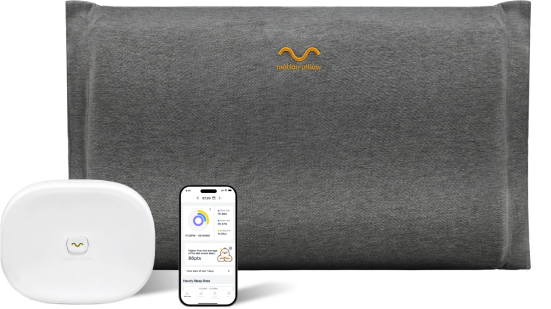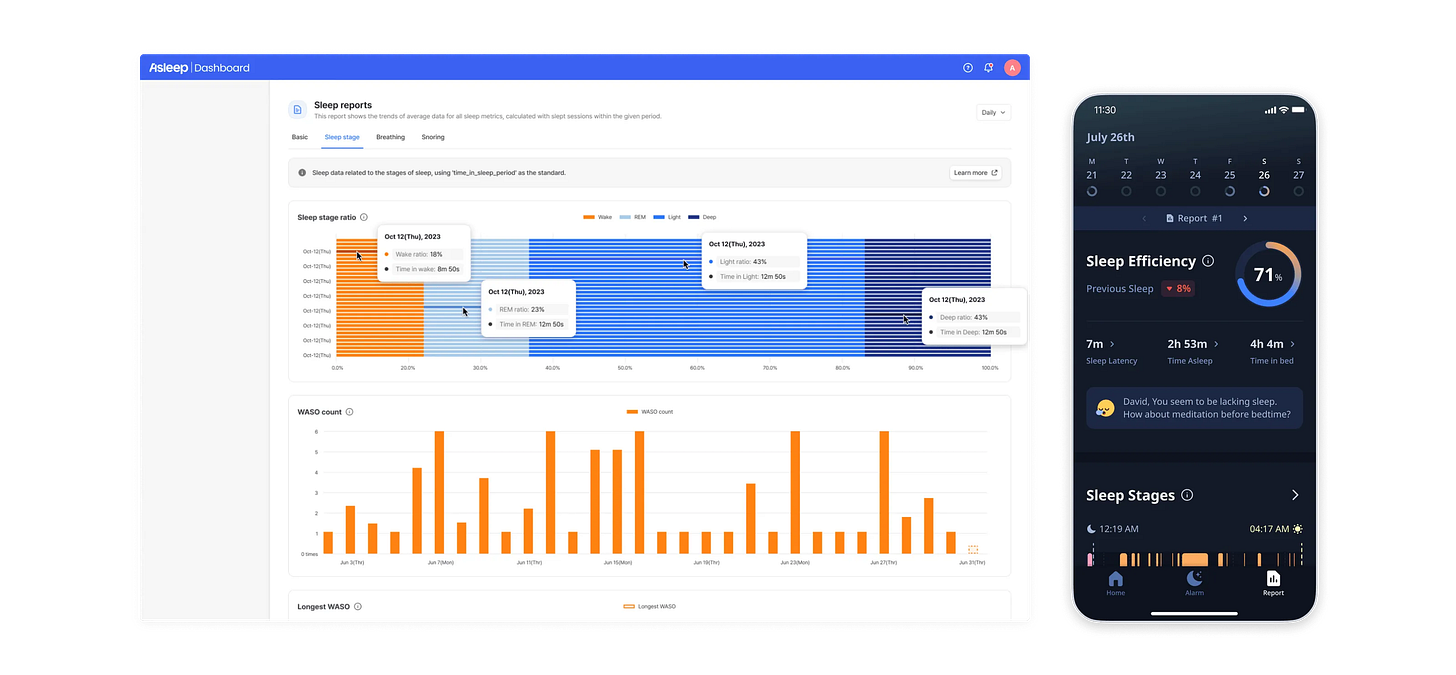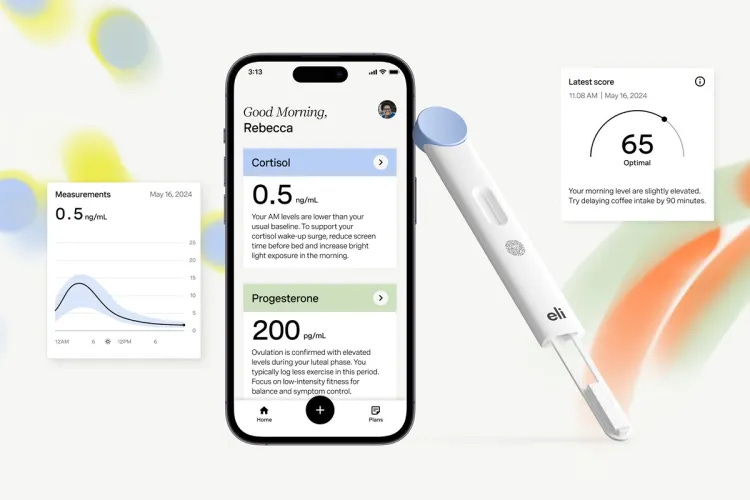TechCare #3 : Sleep Gap, CES 2025 and How Misinformation Erodes Mental Health
💖 TechCare#3 is here! 💖 January felt like a blur, didn’t it? But don’t worry—fresh updates are in, straight from the deep freeze—no frostbite, just insights.
In this Issue – 11 min read
👂 Mind the sleep gap & gender bias
😍 CES 2025 Mental Health & Health Tech Highlights
🥶 How Misinformation Erodes Mental Health, Trust, and Public Well-Being
🟡 New Section : New on Napflix!
💤 Mind the Sleep Gap: Why Women's Exhaustion Goes Unnoticed while men's is overestimated
A NASA study reveals that people underestimate women’s fatigue while overestimating men’s. Despite women reporting higher tiredness, they are perceived as more alert due to their expressiveness and attentiveness. Meanwhile, men’s fatigue is often overestimated.
Women had their fatigue underestimated by about 1.3 points, while men had their fatigue overestimated by 0.9 points.
Journalist Miranda Levy, author of The Insomnia Diaries: How I Learned to Sleep Again, explores whether women are biologically wired to manage exhaustion better or if societal expectations force them to mask tiredness. Her research highlights how gender biases shape perceptions of fatigue, echoing similar disparities in pain recognition.
🌞CES 2025: Tech That’s Changing the Game for Mental Health
CES (Consumer Electronics Show) isn’t just the biggest tech event in the world—it’s where the future is unveiled. Every year in Las Vegas, global giants and ambitious startups showcase the innovations set to redefine how we live, work, and take care of ourselves.
From sleep-enhancing smart devices to hormone-tracking biosensors, CES 2025 proved that mental health tech is no longer just an app on your phone—it’s woven into everyday life.
Notable innovations included:
InTheTech's Eyas Platform: A digital therapy solution targeting patients with mild cognitive impairment and ADHD, utilizing eye-tracking technology to monitor progress in cognitive functions.
AI-Driven Sleep Technology
AI Motion Pillow by Tenminds: This AI-powered pillow detects snoring patterns and gently adjusts head positioning to promote better sleep and reduce snoring.
ASleep's AI Sleep Analysis Technology: ASleep showcased an AI-based system capable of detecting breathing sounds up to 3 meters away. The system analyzes sleep patterns to provide insights into sleep quality and potential disorders.
Ceragem and A-Sleep Collaboration: Ceragem partnered with A-Sleep to develop home healthcare appliances and sleep analysis technologies, aiming to enhance sleep quality through advanced monitoring and personalized recommendations.
Eli Health's Hormometer: This at-home device provides instant saliva tests for hormones like cortisol and progesterone, assisting users in monitoring stress and other health metrics.
Nutrix's cortiSense: This compact device enables users to measure their cortisol levels—a key stress indicator—through a quick, at-home saliva test. A mobile app provides results within minutes.
Movano introduced EvieAI, an AI chatbot integrated into their Evie Ring. Trained exclusively on medical journals, EvieAI aims to provide users with accurate health insights, boasting a 99% accuracy rate.
😶🌫️ Fact-Checking and Its Impact on Public Health
Meta’s recent decision to remove all third-party fact-checkers from Facebook, Instagram, and Threads has sparked global concern. By following the model of X (formerly Twitter), Meta is shifting to user-based community notes, effectively abandoning institutional oversight. Nobel Prize-winning journalist Maria Ressa warns that this shift could lead to a "world without facts."
Meta’s platforms are used daily by about 3.3 billion people worldwide and, for many people, especially in the global south, Facebook is the internet—this change has profound implications. As tech writer Chris Stokel-Walker notes, "where Meta goes, the world—online and offline—follows."
Meta’s choice prioritizes profit over the well-being of its users, a move that exacerbates the dangers of misinformation.
📈 The Rising Influence of Unverified Sources
A growing number of people—especially young adults—now get their news from social media influencers rather than traditional outlets. A Pew Research study found that 37% of adults under 30 rely on influencers for news, with most believing that this content differs from mainstream reporting. However, 77% of these influencers have no journalistic background, further blurring the line between credible information and opinion-driven content.
🧠Misinformation and Mental Health
Misinformation is not just a political issue—it has direct consequences for public health.
Studies show that exposure to health misinformation is linked to an increase in unhealthy behaviours and psychological distress (Luk et al., 2021; Singh et al., 2022).
A systematic review (Schmid et al., 2023) found that in nearly half of cases, misinformation negatively impacted people’s knowledge, attitudes, and behaviour.
The effects are tangible: misinformation erodes trust in science, dissuades people from vaccination, and undermines support for environmental measures. It cultivates fear, confusion, and emotional fatigue, making individuals more susceptible to misinformation loops. When people lose faith in verified health advice, public health measures struggle to gain traction, resulting in real-world consequences.
Does daily consumption of misinformation increase anxiety and depression?
Hammad & Alqarni (2021) found a significant link between exposure to misinformation via social media and increased anxiety,
depression, and social isolation. Beyond eroding trust, misinformation also affects those who spread it—those who engage with and share misinformation often experience heightened anxiety themselves. Moreover, this impact is not evenly distributed.
Socio-demographic analysis reveals that women, racial minorities, and individuals
with lower levels of education in the United States experience a disproportionately higher increase in anxiety compared to other users (Gaurav Verma, 2002) Given the massive number of people exposed to misinformation during major real-world events,
its harm extends far beyond public discourse, taking a real psychological toll.
🤞Hope on the Horizon
While social media platforms prioritize profit over safety, resistance is growing.
Finland has taken a proactive stance by integrating media literacy education into primary schools. This initiative, launched in 2020, teaches children to recognize and combat misinformation before it takes root.
Additionally, a movement is emerging to free social media from billionaire control. Canadian tech advocates are developing alternative platforms that prioritize transparency, accountability, and fact-based discussions.
These initiatives offer hope that, even in an era of digital uncertainty, reliable information can still find its place in the public sphere.
The Art of a Good Night's Sleep - 27 min documentary
"Unhappy" is a documentary series available on ARTE.tv, where author Ronja von Rönne explores the question: What do we need to live a happy life? Through engaging interviews and personal experiences, she delves into various aspects of happiness, including sleep, relationships, community, and personal fulfillment.
🇨🇦 Canada’s Mental Health Services Receive Failing Grades
A CAMIMH report reveals that Canada’s mental health and substance use services show little improvement, with most provinces receiving failing grades. 90% of Canadians say timely access to care is important, yet six provinces and the federal government received an 'F'. Only British Columbia, Manitoba, and Ontario improved to a 'D'. Mental health funding remains low, making it harder for Canadians to get the care they need.
🇬🇧 200 UK Companies Adopt Permanent Four-Day Workweek
Two hundred UK companies have permanently implemented a four-day working week for all employees without reducing pay. This shift aims to enhance productivity and employee well-being. The move reflects a growing trend towards flexible working arrangements in the UK.
🏨 Hilton invests in wellness technology in rooms
Hilton, one of the largest hotel chains in the world, and Calm, a leading company in the field of mental health, announced an innovative collaboration, while also integrating technology. Starting in March 2025, approximately 2,400 Hilton hotels equipped with Connected Room Experience technology will offer, without a subscription, Calm's wellness and sleep support tools.
💖 Loved this newsletter?
Share it as a gift of care!! Let’s spread the love for mental health together.











